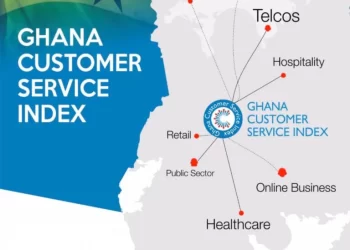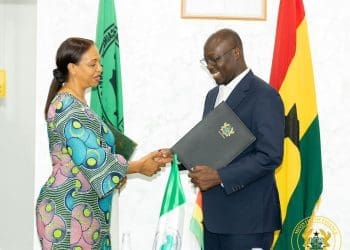Ecobank Ghana has injected $24 million into a major salt pan rehabilitation project aimed at producing over one million tonnes of salt annually, and the initiative is not only reviving existing salt production infrastructure but also establishing new pans to position Ghana as a regional hub for salt production.
Mrs Abena Osei-Poku Managing Director of Ecobank Ghana speaking at the Annual general Meeting said so far, the project has contributed to boosting economic growth, creating employment for 3,000 youth, 40 percent of whom are women.
She pointed out that this investment is part of Ecobank’s larger sustainability strategy to support economic development while advancing environmentally responsible practices.
Driving Green Transport with $300,000 E-Mobility Push
In addition to its salt sector investment, she said Ecobank has also invested $300,000 to promote clean transportation and e-mobility solutions in Ghana.
This initiative focuses on providing support for the development of sustainable transportation solutions for Ghana.
Ecobank is actively promoting the development of electric vehicles (EVs), electric bikes, and building critical infrastructure such as charging stations.
This provides eco-friendly mobility options for customers, while fostering economic growth and job creation, as a contribution for building a green economy.
Mrs Osei-Poku noted that the bank’s green transport drive is expected to reduce carbon emissions, improve urban transportation systems, and stimulate job creation in Ghana’s growing green economy.
It also included a nationwide campaign to educate the public on the long-term benefits of sustainable transportation, aiming to boost adoption across different sectors.
Leading Climate Action with Solar Energy and Concessional Financing
Ecobank continues to take a leadership role in environmental sustainability through programmes such as the Accelerating Solar Action Programme (ASAP), approved by the Green Climate Fund.
The MD said the ASAP project is designed to cut carbon dioxide emissions by approximately 417,452 metric tonnes through concessional financing of solar-powered solutions for small and medium enterprises (SMEs) and households.
She noted that by expanding access to affordable solar technology and enforcing stringent project assessments, the Bank is helping to scale up green energy access while supporting Ghana’s transition to cleaner power sources.
Promoting ESG education and community engagement
beyond financing projects, Mrs. Osei-Poku said Ecobank has launched extensive training and outreach programmes to support environmental, social, and governance (ESG) awareness.
She noted that the Bank’s other notable initiatives, such as Ellevate onboarding and interactive sessions for women executives, have promoted financial literacy and sustainability knowledge among thousands of Ghanaian professionals.
Also, the bank’s youth and mass market outreach activities have engaged over 180,000 individuals nationwide, strengthening community participation in sustainable development goals.
Celebrating sustainability week with hands-on action
during its maiden Sustainability Week, Ecobank collaborated with two partner organisations to host a Green Fair, hold a webinar for staff, and roll out themed activities such as “Wear Green, Eat Green.”
As part of the event, she said the Bank donated recycled exercise books, waste separation bins, and up cycled handwashing basins to St. Paul Senior High School in Denu, Volta Region.
The week’s activities were aimed at reinforcing green habits both within the institution and across the communities it serves.
A model for green banking in africa
With its growing portfolio of environmental initiatives and community-focused programmes, Ecobank Ghana is emerging as a model for sustainable banking in Africa.
Through strategic investments, targeted education, and climate-conscious financing, the Bank is aligning financial performance with ecological and social responsibility, helping to shape a greener future for Ghana, and, by far, Africa.














